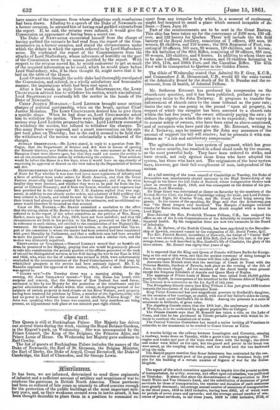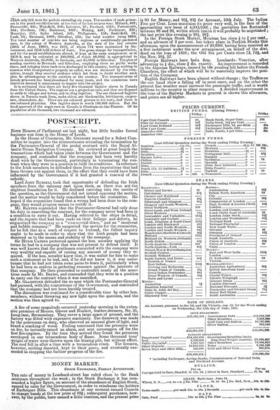Yiligullnuratts.
IT has been, we are informed, determined to send three regiments of infantr¢ and a sufficient amount of artillery and munitions of war to reinforce the garrisons in British North America. These garrisons had been so reduced of late years as scarcely to afford sentries enough for the protection of the public buildings at the most important, mili- tary posts, and, as their wealmess seemed even to invite attack, it has been thought desirable to place them in a position to command re-
spect from any irregular body which, in a moment of excitement, might feel tempted to assail a place which seemed incapable of de- fence.—Times, June 10.
Part of the reinforcements are to be sent in the Great Eastern. This ship has been taken up for the conveyance of 2500 men, 100 offi- cers, and 122 horses for Quebec. These will include the 4th field battery of the Royal Artillery, consistinn.° of 7 officers, 220 men, 20 women, 25 children, and 110 horses; the 30th Regiment of Foot, con- sisting of 39 officers, 868 men, 80 women,.120 children, and 6 horses; the 4th battalion of the 60th Rifles, consisting of 39 officers, 868 men, 80 women, 120 children, and 6 horses. In addition to whom there are to be also 4 officers, 102 men, 9 women, and 19 children belonging to the 16th, 17th, and 100th Foot, and the Canadian Rifles. The 47th Foot will be transported to Quebec in the Golden Fleece.
The Globe of Wednesday stated that Admiral Sir F. Grey, K.C.B., and Commodore J. R. Drummond, C.B. would fill the seats vacant at the Admiralty Board by the death of Sir R. S. Dundas and the re- tirement, from ill health, of Admiral Pelham.
Mr. Sotheron Estcourt has produced his compromise on the church-rate question, and it has been published, prefaced by an ex- planatory letter to Sir John Trelawny. It proposes to transfer the enforcement of church rates to the same tribunal as the poor rate ; limits the rate to one penny in the pound "upon all property, in respect of which the occupier has been assessed to a church rate within the last five years," the owner ultimately paying the rate ; it defines the objects on which the rate is to be expended; the vestry is to consist solely of owners, who have been rated as above-mentioned, and of occupiers who have paid the rate. Mr. Estcourt, writing to Sir J. Trelawny, says he cannot give Sir John any assurance of the amount of support the bill will receive; but he presents it with con- fidence as " a-fair and satisfactory compromise."
The agitation about the hour system of payment, which has gone on for some months, has resulted in a final stand made by the masons, as the most powerful body. They have been ordered to strike, and have struck, not only against those firms who have adopted the system, but those who have not. The originators of the hour system have, however, got their full complement of men, independent of the unions.
At a full meeting of the town council of Cambridge on Tuesday, the Duke of Devonshire was unanimously elected successor in the High Stewardship of the borough to his Grace the late Duke of Bedford, whose inauguration thereto took place as recently as April, 1800, and was consequent on the demise of his pre- decessor, Lord Macaulay. Sir Hope Grant was entertained at dinner on Saturday by the members of the United Service Club, the Duke of Cambridge taking the chair, and Lord Palmer- ston, Lord Elgin, Sir Charles Wood, and Mr. Frank Grant being among the guests. In the course of the speaking, Sir Hope said that the Armstrong gun was "the finest weapon ever invented." the Marquis d'Audigne returned thanks for Baron Gros, whose health had been drunk coupled with a toast to Lord Elgin.
Rear-Admiral the Hon. Frederick Thomas Pelham, C.B., has resigned his office as one of the Lords Commissioners of the Admiralty in consequence of his impaired health. By his resignation there are now two vacancies in the Board of Admiralty. Mr. J. R. Bulwer, of the Norfolk Circuit, has been appointed to the Recorder- ship of Ipswich, rendered vacant by the resignation of Ivir. David Power, Q.C. The Rev. Patrick Brontfi, incumbent of Haworth, the father of " Currer Bell" and her two clever sisters, Acton and Ellis Bell, died on the 7th inst. at his par- sonage-house, so well described in Mrs. Gaskell'a life of Charlotte, the glory of the three sisters. Mr. Brontë was eighty-four years of age.
It is expected that the King and Queen of Prussia will leave Berlin for Konigs- berg at the end of this weer', and that the ancient ceremony of doing homage to the new occupant of the Prussian throne will then take place there. Accounts from Munich state that the marriage of Count de Trani with the Princess Matilda, Duchess of Bavaria, took place on the evening of the 5th of Jane, in the court chapel. All the members of the ducal family were present except the Empress Elizabeth of Austria and Queen Mary of Naples. The appanage of Prince Louis of Hesse has been raised from 18,000 gulden yearly to 40,000, in consequence of his betrothal to the Princess Alice of England. The increase is to commence on the 1st April of this year. The Konigsberg Gazette states that King William I. has just given 1600 thalers towards the monument of the philosopher Kant.
King Victor Emmanuel has sent magnificent presents to Garibaldi's daughter, on the occasion of her marriage, as stated, with one of her father's aides-de-camp, who, it is said, saved Garibaldi's life in Sicily. Among the presents is a suite of ornaments in brilliants, of great value. The Augsburg Gazette states that the 18th inst., the anniversary of the battle of Waterloo, is to be celebrated by a grand popular fête at Cologne.
The Trieste Gazette says that M. Kossuth has taken a villa on the Lake of Como, and that he has purchased at Trieste portable presses with which he in- tends to continue the manufacture of notes.
The Central Venetian Committee has issued a notice inviting all Venetians to subscribe to the monument to be erected to Count Cavonr at Turin.
A wooden bridge on the railway between Leamington and Coventry, crossing a roadway, broke down on Tuesday, while a goods train was passing over. The engine and tender and part of the train went down with the bridge; the driver and stoker were killed on the spot, but the guard and porter in the break van were saved, as the coupling iron broke, and the shock sent the van backward along the rails.
The Madrid papers mention that Senor Salamanca has contracted for the con- striction of an important part of the proposed railway in Southern Italy, and also for the building of a certain number of frigates of war for the Italian kingdom.
The report of the select committee appointed to inquire into the present system of transportation, its utility, economy, and effect upon colonization, was published on Thursday. It states that since the discontinuance of transportation to New South Wales and Van Diemen's Land, and the substitution of sentences of penal servitude for those of transportation, the number and duration of such sentences have greatly decreased ; the average annual number of sentences of transportation in the three years, 1850 to 1852 inclusive, having been 4962, all of which were for periods of seven years and upwards ; and the average annual number of sen- tences of penal servitude, in the three years, 1858 to 1860 inclusive, 2723, of Mich only 515 were for periods exceeding six years. The number of male prison- ers in the penal establishments at the date of the last returns was: Milbank, 469; Pentonville, 391; Wakefield, 316; Leicester, 97; Portland, 1518; Portsmouth, 984; Chetbam, 796; Dartmoor, 1037; Woking, 459; Parkhurst, 236; Mountjoy, 213; Spike Island, 503; Philipstown, 158; Smithfield, 56; Lusk, 64; Bermuda, 1009; Gibraltar, 563; the total number being 8869. The total number of convicts not being expirees or conditionally-pardoned men, in the colony of Western Australia, at the date of the last returns (30th of June, 1860), was 24321 of whom 774 were maintained by Go- vernment, and 1658 held tickets of leave. The gross charge for transportation, and for the penal establishments abroad, if kept at the same complement as in 1858-9, may be estimated at 180,0001., of which 80,000/. is appropriated to Western Australia, 65,0001., to Bermuda, and 35,0001. to Gibraltar. The plan of sending convicts to Bermuda and Gibraltar, employing them on public works there, and bringing them back to be discharged in this country, having nothing in common with transportation properly so called, was not discussed by the com- mittee, though they received evidence which led them to doubt whether such plan be advantageous to the convicts or the country. The transportation of female prisoners has been abandoned for many years, and the committee have therefore deemed it unnecessary to inquire into the subject. It is estimated that there are forty-five thousand fugitive slaves in Canada from the United States. The negroes are a gregarious race, and they are disposed to settle in villages and towns, and to cling together. The one thousand fugitive slaves in Toronto wash linen, make shirts, are blacksmiths, bricklayers, carpen- ters, shoemakers, &c. There are six coloured grocers in the town, and there is one coloured physician. One fugitive slave is worth 100;000 dollars. But the bead-quarters of the negro race in Canada is Chatham-on-the-Thames. Of its population of six thousand, two thousand are coloured.































 Previous page
Previous page